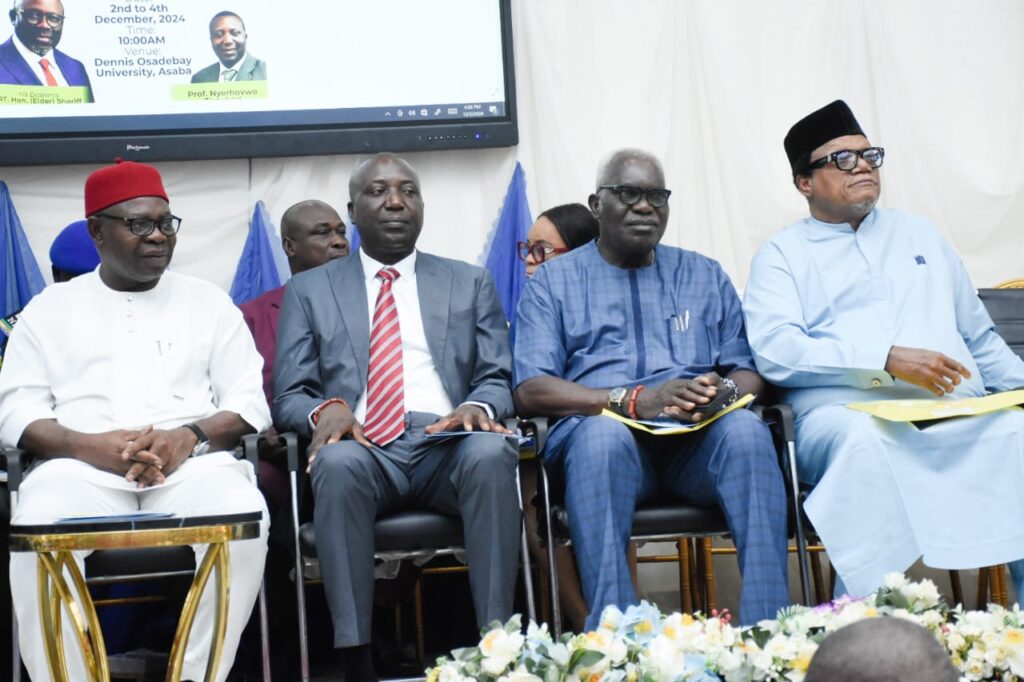Delta State Governor, Rt. Hon. Sheriff Oborevwori, Tuesday, December 3, 2024 said the 2nd Higher Education Summit would provide the platform to reinvent and reinvigorate the funding landscape for tertiary institutions in Delta State.
Governor Oborevwori stated this while declaring open the 2nd Higher Education Summit at Asaba.
The governor who was represented by his Deputy, Sir Monday Onyeme, noted that the theme of the summit, “Alternative Funding For Tertiary Institutions” is most apt, saying it would help to share ideas, explore innovative solutions and foster a spirit of collaboration among educators, policy-makers, and students.

Governor Oborevwori noted that, government aim is to reinvent and reinvigorate the funding landscape for tertiary institutions in Delta State.
He added that, the challenges facing higher education were not peculiar to governance, saying that government’s response can be distinctively innovative and transformative.
He said: “As we look around this lecture theatre, we see a diverse tapestry of individuals who represent the future of our society.
“From distinguished scholars to motivated students and dedicated educators, each of you play a crucial role in shaping the landscape of Higher Education.
“Together, we stand on the threshold of change, with an opportunity to redefine our approach to learning and development.”
Governor Oborevwori noted that his administration has witnessed remarkable strides in addressing the challenges faced by higher Institutions in the state and have fostered renewed commitment to accessibility, equity and quality in education.
“You are all witnesses to the giant stride development in the history of our tertiary institutions in the State. (Four universities, three polytechnics, two colleges of education) yet there is still much work to be done.
“Our tertiary institutions are not just centres of learning, but engines of social mobility, economic development and human capital transformation. Yet, we cannot ignore the increasing financial challenges confronting these critical institutions.
“The idea for this summit is therefore not just apt, but timely as it reflects our commitment to innovative solutions.
“As a state, we recognize that sustainable education funding requires a multi-faceted approach that goes beyond conventional government allocations.
“Our State’s unique economic landscape demands a revolutionary approach to educational funding and with our robust industrial sectors ranging from petrochemicals, agriculture, and emerging technology, we have unprecedented opportunities to create innovative educational financing models,” Governor Oborevwori stated.
The governor who observed that, the world is evolving at an unprecedented pace with technological advancements reshaping industries, while global challenges such as climate change, social inequality and health crises require innovative solutions, noted that, it is imperative the state higher education system is not only responsive to these changes, but also anticipatory and equipping students with the skills, knowledge and critical thinking necessary to thrive in an ever-changing world.
Governor Oborevwori urged stakeholders at the summit to engage in meaningful dialogue about the future of higher education.
He said: “Let us explore how we can all collectively fund higher education, enhance our curricular to reflect the demand of the modern workforce. How can we bridge the gap between academia and industry to ensure that our graduates are not only job — ready but also equipped to lead in their fields.
“We need to foster partnership with local businesses, non—profit organizations and government agencies to create pathways for experiential learning and internships.
“Equally important is our commitment to diversity and inclusion; our institutions must reflect the rich diversity of our population, ensuring that every student has equitable opportunity to succeed.
“It is our responsibility to create a culture where every voice is heard and every perspective is valued. Only then can we cultivate a truly enriching educational experience”.
Earlier, in a welcome address, the Commissioner for Higher Education, Prof. Nyerhovwo Tonukari, said traditional funding models provided by the government are increasingly insufficient to meet the growing demands for quality education and research.
Prof Tonukari noted that, the state government has been exceptionally generous in supporting its nine tertiary institutions. He said, the government funds the salaries of all academic and non-academic staff.
According to him; “Our state was among the first states to implement the 25/35% salary review for tertiary institution staff, including several months’ arrears. Delta State also led the way in paying the new minimum wage, which we all are currently enjoying. The government also provides bursaries to over 30,000 students annually.
“Today I will like to inform you that the capital budget for the Ministry of Higher Education is N32 billion. By the end of the 2024/2025 admission period, approximately 25,000 candidates will have been admitted to study various courses in the nine state -owned tertiary institutions”.
Prof. Tonukari urged management and Deans of higher institutions to do more to enhance education in Delta State.
“You must adopt innovative strategies to secure additional funding to expand and improve your institution. However, we expect these initiatives to be financed through your Internally Generated Revenue (IGR),” he stated.




GIPHY App Key not set. Please check settings